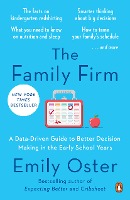From the bestselling author of Expecting Better and Cribsheet, the next step in data driven parenting from economist Emily Oster.Parenting is a full-time job. It's time we start treating it like one."A targeted mini-MBA program designed to help moms and dads establish best practices for day-to-day operations…It's all presented in the breezy, skeptical style that's made Oster's work a must-read for parents." -The Washington PostIn The Family Firm, Brown professor of economics and mom of two Emily Oster offers a classic business school framework for data-driven parents to think more deliberately about the key issues of the elementary years: school, health, extracurricular activities, and more.Unlike the hourly challenges of infant parenting, the big questions in this age come up less frequently. But we live with the consequences of our decisions for much longer. What's the right kind of school and at what age should a particular kid start? How do you encourage a healthy diet? Should kids play a sport and how seriously? How do you think smartly about encouraging children's independence? Along with these bigger questions, Oster investigates how to navigate the complexity of day-to-day family logistics.Making these decisions is less about finding the specific answer and more about taking the right approach. Parents of this age are often still working in baby mode, which is to say, under stress and on the fly. That is a classic management problem, and Oster takes a page from her time as a business school professor at the University of Chicago to show us that thoughtful business process can help smooth out tough family decisions.The Family Firm is a smart and winning guide to how to think clearly-and with less ambient stress-about the key decisions of the elementary school years.

